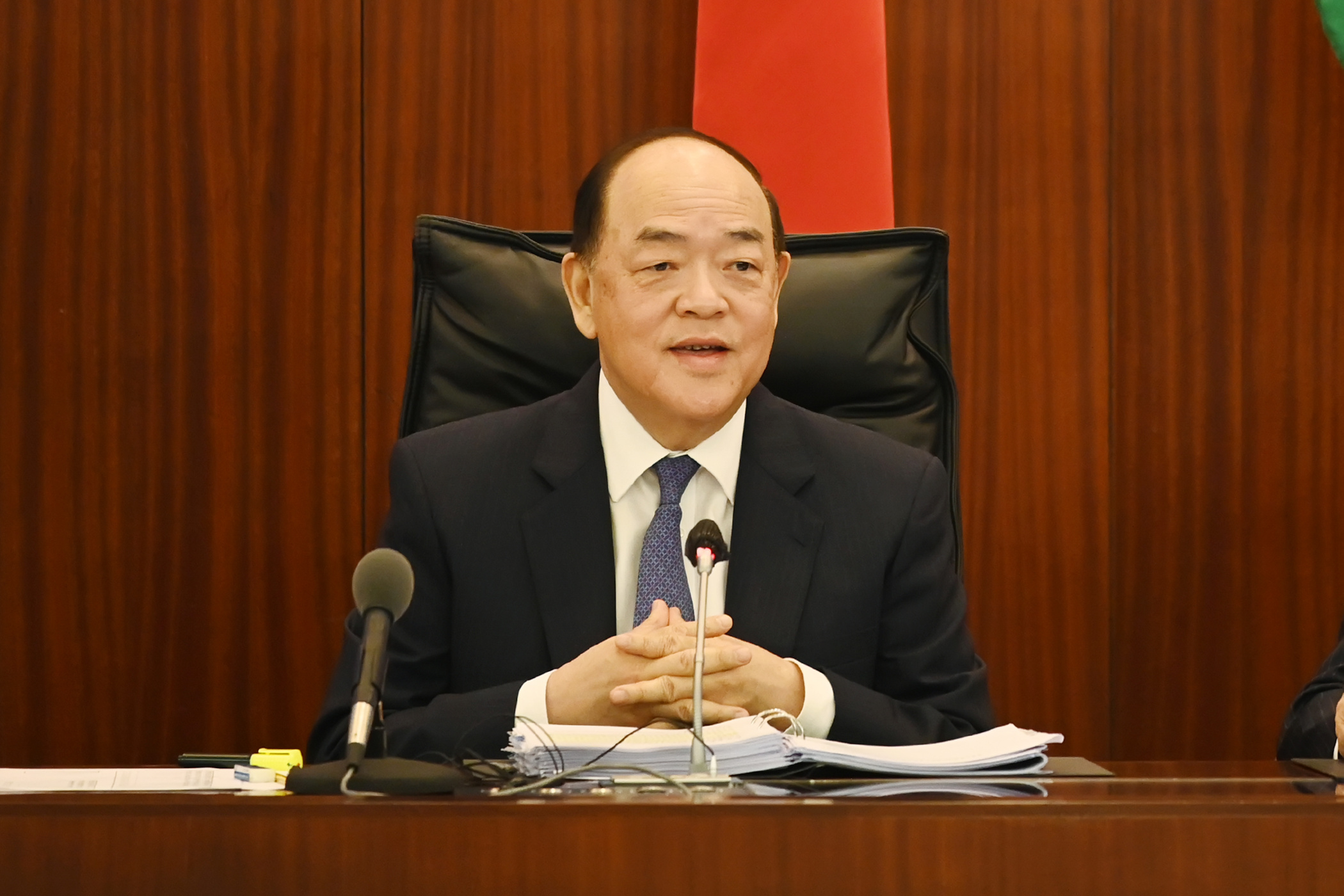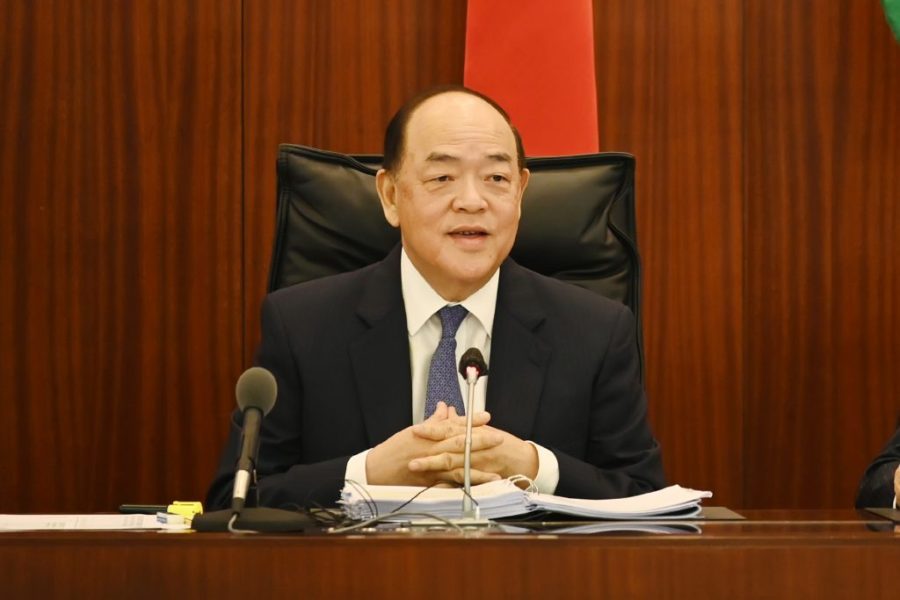Chief Executive Ho Iat Seng said on Tuesday the government now plans that the “East” section of the Light Rail Transit (LRT) – a sea-crossing LRT section connecting the peninsula’s Barrier Gate border checkpoint to the Taipa Ferry Terminal and the adjacent airport via the land reclamation areas known as Zone A and Zone E1 – to be constructed underground.
The Chief Executive also pledged that the government will launch a public consultation this year on the LRT “East” section project.
Ho also revealed that the local government has requested the central government’s permission to reclaim land in the waters off the northern coast of the peninsula so that the LRT “East” section project can get off the ground.
Zone A lies off the north-eastern coast of the peninsula, while Zone E1 lies off the north-eastern coast of Taipa between Friendship Bridge and the Taipa Ferry Terminal in Pac On.
Ho made the remarks in response to a question from directly-elected lawmaker-cum-banker Alan Ho Ion Sang during a Q&A session in the legislature’s hemicycle on Tuesday afternoon. The session was held a day after the chief executive delivered his 2020 Policy Address.
Macau’s first LRT – the Taipa section – came into service on December 10 last year. The LRT Taipa section cost between MOP 10.1 billion and 10.2 billion.
The 9.3-kilometre-long Taipa section, which also covers Cotai, has 11 stations.
The government still does not have a final plan for the LRT project on the peninsula.
The government has indicated that it plans to build the “East” section first before finally going ahead with the LRT peninsula section. It launched a feasibility study of the LRT “East” section project in late 2018.
During Tuesday’s plenary session, Ho said that the LRT with its operation limited to Taipa would be unable to improve Macau’s public transport system. Ho said that therefore the government would launch a public consultation this year on building the LRT “East” section, and was determined to get the Seac Pai Van section and the Hengqin section – connecting Macau’s Cotai and Zhuhai’s Hengqin Island – off the ground “as soon as possible”.
The 1.6-kilometre-long Seac Pai Van section will connect the LRT Taipa section and the Seac Pai Van public housing estate in Coloane.
Ho pointed out that he has discussed the LRT “East” section project with Secretary for Transport and Public Works Raimundo do Rosário, representatives from the local government-owned LRT company and the local company of Hong Kong’s MTR in many meetings. Ho said that the local government plans for the “East” section to start from the LRT station outside the Taipa Ferry Terminal, pass through Zone E1, cross the sea through a tunnel, and be built underground in Zone A and the land to be reclaimed off the northern coast of the peninsula, before arriving at the Barrier Gate checkpoint.
Ho said that the LRT “East” section would be eight to nine kilometres long and have three stations in Zone A.
Chief Executive Ho Iat Seng answers questions from lawmakers during Tuesday’s four-hour Q&A session in the Legislative Assembly’s (AL) hemicycle.
‘Like a metro’
Ho also said that the whole “East” section would possibly be built underground. “It will be operated like a metro,” Ho said, adding that the section to be constructed underground would save Macau’s scarce land resources.
Ho acknowledged that building the “East” section underground would require higher costs, adding that the government was assessing whether it could afford the higher costs.
Ho also said that the local government has applied to the central government for permission for a land reclamation project off the northern coast of the peninsula. After completion of the reclamation, the roads along the coast will be widened, while the LRT “East” section will be built underground in the area to be reclaimed, before arriving at the Barrier Gate checkpoint.
Ho underlined that this year’s public consultation on the LRT “East” section project is what he had promised in his 2020 Policy Address which he delivered on Monday.
Ho pledged that the local government will get the LRT “East” section project off the ground “as soon as possible” if residents agree to its proposal during the upcoming public consultation and the central government approves its request for the land reclamation off the peninsula’s northern coast.
Ho also said he believed that the LRT Taipa section will play its role again in helping people travelling in Taipa and Cotai after the central government resumes the issuing of mainlanders’ permits to travel to Macau on its Individual Visit Scheme once the COVID-19 crisis is over.
Ho said that consequently he ordered the LRT company to maintain the operation of the Taipa section – despite “almost no” passengers due to the COVID-19 epidemic – and keep carrying out tests, so as to ensure its smooth operation after passengers return to use the LRT in the future.
Non-establishment lawmaker Ng Kuok Cheong told reporters after the Q&A session that he supported Ho’s LRT “East” section project, calling it a “revolution.”
No gaming tax cut
Meanwhile, Ho reaffirmed during Tuesday’s plenary session that the government will not lower Macau’s gaming tax rate of 35 per cent, when answering a question from directly elected lawmaker-cum-building contractor Mak Soi Kun.
Macau’s gaming operators pay 35 per cent of their gross gaming revenues as direct tax to the government. Besides, they also pay an additional four to five percent of their gross receipts as so-called “contributions” (dues) into the public coffers for a string of social, cultural and other causes.
Ho said that while the city’s six gaming operators have been going through a trough over the past several months due to the impact of the COVID-19 epidemic, they have the financial capability to maintain their operations and a clear plan to continue developing their businesses.
Ho underlined that the government will not lower the gaming tax rate now and in the future, adding that a possible reduction in the tax rate would need a consensus in civil society.
The 35 per cent gross gaming revenue tax rate is enshrined in Macau’s 2001 gaming law, which can only be changed by the legislature based on an amendment bill from the government.
(The Macau Post Daily/Macau News)
PHOTO © Government Information Bureau (GCS)






